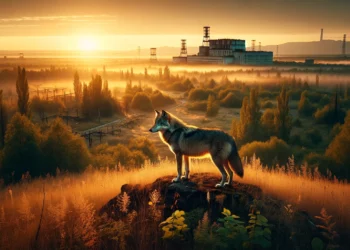
The fierce dire wolves dominated the ecology of Pleistocene America. Scientists still know very little about this extinct large carnivore, but a new study is filling in some of the blanks. According to a new study that sequenced five genomes from samples dating from 13,000 to more than 50,000 years ago, dire wolves were very different from today’s extant grey wolves, despite their similar appearance.
The last of the dog lineage in the Americas
Dire wolves were first discovered in the 1850s. Their abundant remains numbering in the thousands have been scattered all over the two American continents, from Canada to Bolivia. These were highly effective predators who could grow up to two meters (~six feet) long and had skeletal adaptations that made them suited for taking down huge megafauna that roamed the land before the last ice age.
Due to their morphology, scientists have always presumed that dire wolves and modern wolves must have been closely related. But a new study published this week in the journal Nature seems to remind us that similar skeletons and other morphological features do not necessarily reflect kinship.
The team of researchers, which involved scientists at Durham University in the U.S. and the University of Adelaide in Australia, sequenced the DNA from five dire wolf bones. The scientists embarked on this study to learn more about the biology of dire wolves, but they were shocked to find by the genome sequence that the extinct beasts last shared a common ancestor with living wolf-like canines around 5.7 million years ago. Dire wolves actually diverged from African jackals around 5.1 million years ago.
So the strong resemblance between the two, strange as it may sound, is simply incidental — a fine example of convergent evolution, whereby two unrelated species develop similar adaptations. In this case, two unrelated species evolved a similar appearance, probably due to similar habitats and ecological niches.
And despite the frequency of hybridization among Canidae members, dire wolves and the ancestors of modern wolves and coyotes never interbred, which must mean they lived in geographical isolation from one another. Yet just one of the two lineages survived, so perhaps this lack of admixture may have contributed to their downfall.
It is possible that the ancestor of grey wolves and coyotes had some gene variants that were more advantageous in the shifting environment that saw dire wolves unable to adapt during the Late Pleistocene megafaunal extinctions. Gray wolves are famous for their adaptability. Dire wolves, not so much it seems.






